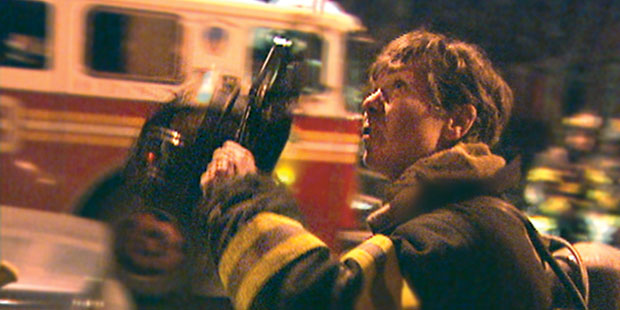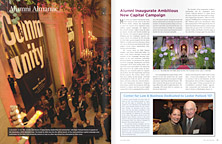A Firefighter and Trailblazer
For 24 years, FDNY Captain Brenda Berkman has been proving courage is gender neutral.
Printer Friendly VersionShunning lawyerly business suits to don the blue uniform of the New York Fire Department—as a woman, no less— Brenda Berkman ’78 knows what it means to follow Robert Frost’s proverbial road less traveled. “I knew I was in for a struggle, but I’m the eternal optimist. Maybe it’s that midwestern thing,” says the native Minnesotan.
A no-nonsense woman with the lean physique of the former marathon runner she is, a penetrating gaze and a surprisingly quiet and low voice, Berkman, 54, was the main subject of Taking the Heat: The First Women Firefighters of New York City, a documentary narrated by Susan Sarandon that conveys the isolation, harassment and danger these pioneering women endured. The film had its world premiere at Tishman Hall last February, and later aired on PBS.
The facts are that in late 1977, about 500 women signed up for the first NYC firefighter entrance exam that wasn’t restricted to men. Of those who passed the written test, 89 continued to the physical one. All of them, including Berkman, failed. In 1979, Berkman filed a highly publicized, lengthy and contentious lawsuit that challenged the exam’s validity. A federal judge in 1982 upheld Berkman’s claims—that the feats required in the physical exam weren’t essential to fire fighting and discriminated against women—and a new exam and training program were ordered. Later that year, Berkman joined the fire academy’s first class of 47 women trainees.
But the real battle was just beginning. The women were routinely harassed. One particularly dangerous act was to drain the women’s air tanks so that when they were called to a fire they either had to run in without oxygen or be considered cowards. The women were shut out of meals and were subjected to obscenities, verbal abuse, physical violence, sexual molestation and even death threats from other firefighters. “Not all men participated in the harassment,” Berkman says. However, those men who stood up to defend the women became targets themselves.
“There was a lot of opposition to having women in the firehouse,” says Berkman’s attorney, Clinical Professor of Law Laura Sager, who was then the director of the Women’s Rights Clinic at NYU School of Law. “It was a guys’ club.” In many ways, fire fighting still is. “There is still a misogynist climate that goes on in fire departments all over the world because some people still believe that this is a man’s job,” Berkman says.
Indeed, Berkman has earned two promotions by virtue of passing exams. Now as captain of Engine 239 in Brooklyn, she is the first to rush into a burning building. “Any firefighters who say they have never been frightened at an incident are either lying or crazy,” she says.
She has earned a measure of respect and has “a very good relationship” with her allmale engine company, she says, while noting that working with another woman would be a plus. “But I’m so far along in my career. I’m not going to spend my last few years agonizing about whether I’d like to be a lot happier. I’m taking it for what it is, right now.”
Young women firefighters are grateful to Berkman for paving the way. “I don’t think a lot of us would have the courage to do this job if it weren’t for Brenda,” says Regina Wilson, 37, who joined the force in 1999. Berkman’s efforts have not only enabled women to work side by side with men, says Wilson, but have led to even small improvements that loom large in the everyday life of a firefighter, like “having shoes and shirts that fit, female bathrooms in the firehouse and lingo that is gender friendly.”
Even as a child, Berkman challenged the status quo. “One of my earliest memories is of trying to get into the [then-boys-only] Little League,” she says. At school, she wanted to take shop, but was forced to study home economics; she liked math but was discouraged by a teacher. She irked high school authorities by organizing forums for voters to quiz school board candidates. “I thought that kids should have some say in what kinds of things they could pursue,” she says.
Berkman graduated summa cum laude from St. Olaf College in Northfield, Minnesota, then in 1975 earned her M.A. in history from Indiana University, where she met her now ex-husband, Kenneth Gordon, and moved to New York. She attended the NYU School of Law while working at her father-inlaw’s law firm—whose client roster included the Uniformed Fire Officers Association. It was in part getting to know the fire officers through her job that piqued her interest in joining the FDNY.
Almost 25 years after her victory, however, what rankles her most is how tenuous the hard-fought gains have been. “After 9/11 the buzzword was ‘the brothers,’” says Captain Peter Gorman, president of the Uniformed Fire Officers Association. In the six months after 9/11, the FDNY hired just one woman among more than 600 recruits, and today just 29 of the city’s nearly 11,500 firefighters are women. Gorman agrees with Berkman that the city doesn’t do enough to recruit women or minorities. He notes that the city rarely uses women in their promotional efforts.
“I am proud that I challenged and continue to challenge the fire service for the benefit of women and the larger community,” Berkman says. “Being forced to conform to narrow stereotypes of what you can and can’t do with your life, that hurts men as much as women.”

